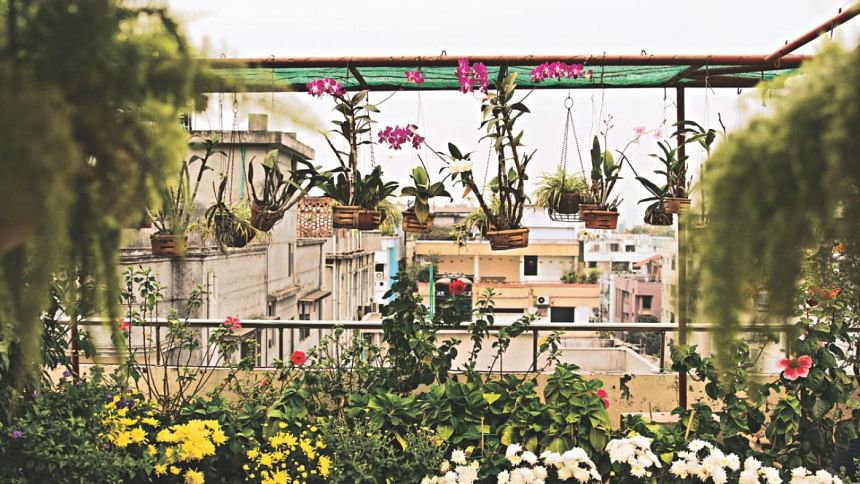Rooftop Gardening: Making Dhaka green again


Against the backdrop of a generation growing up in a dusty city that is fast losing its green, open spaces and is frequently topping the list of having “most polluted air”, many Dhaka residents have begun to show interest in rooftop gardening. Experts say, this can improve air quality, provide fresh food and bring down ambient temperature, apart from the obvious aesthetic appeal.
In a survey done by Stamford University -- on 2,700 buildings in Dhanmondi, Lalmatia, Mohakhali DOHS and Uttara, researchers found 36.4 percent rooftops were used for gardening. This study was done two years ago, in both summer and winter.
Asked about the benefits of rooftop gardening in urban areas, Prof Kamruzzaman, chairman of the environmental science department of Stamford University, who led the study, said plants keep the atmosphere cool.
He claimed it can be inferred from the study that areas where rooftop gardening is popular, remains cooler during hot days. Temperature difference varies from 1.8 to 5.4 degrees Celsius due to lack of greenery, Prof Kamruzzaman said.
The study also observed fewer rooftop gardens on commercial buildings than residential ones.
Architect Sabbir Ahmed, who designs both commercial and residential structures, said gardening is a hobby for tenants in residential buildings, whereas offices only consider gardens “decorative”.
“People are often reluctant to set up gardens as they will have to invest time and money to maintain them, but the advantages of this practice clearly offset the extra effort,” he said.
Ahmed said rooftop gardening should be taken into consideration at the time of construction. Singapore, a city that aims to be the world's greenest, already has a rule that new developments must include plant life in the forms of vertical gardens or verdant walls.
Fahmida Khanom, director of Natural Resource Management at Department of Environment, said there should be guidelines on urban plantation as it can have an impact on biodiversity.
The guidelines can provide suggestions on which species would be the best for our environment, she added.
Environmentalist Dr Atiq Rahman said widespread use of air conditioner releases heat and harmful gas. Rooftop gardens can relieve city dwellers from excessive heat. Proper maintenance can have a cumulative effect on the temperature.
Golam Maruf, senior consultant (monitoring and evaluation) of Agro-Meteorological Information Systems Development Project at the Department of Agricultural Extension, said a 5,000 square feet rooftop garden can meet a family's daily requirement of vegetables within a year of cultivation. Food can be grown without insecticides, he added.
Dhaka North City Corporation (DNCC) and Dhaka South City Corporation (DSCC) have taken a number of environment-friendly initiatives. The city corporations gave 10 percent holding tax rebate in the first quarter of the fiscal year in 2016-2017 and 2017-2018 for gardening on roofs.
Green Savers, a non-profit organisation which works to familiarise and teach people about rooftop gardening, has set up 3,600 rooftop gardens across Dhaka so far.
A 2007 study done in Singapore found that a green roof tends to experience lower surface temperature than the original exposed roof surface, especially in areas well covered by vegetation. It found that maximum 60 percent of heat gain could be stopped by this system.
Often times, urban planning fails to consider the climate and environment. Rooftop gardening is an easy, environmentally friendly way that can make this city more liveable.
Do you have a Dhaka Vibe story to share? Email us your ideas or reports to [email protected].

 For all latest news, follow The Daily Star's Google News channel.
For all latest news, follow The Daily Star's Google News channel. 



Comments